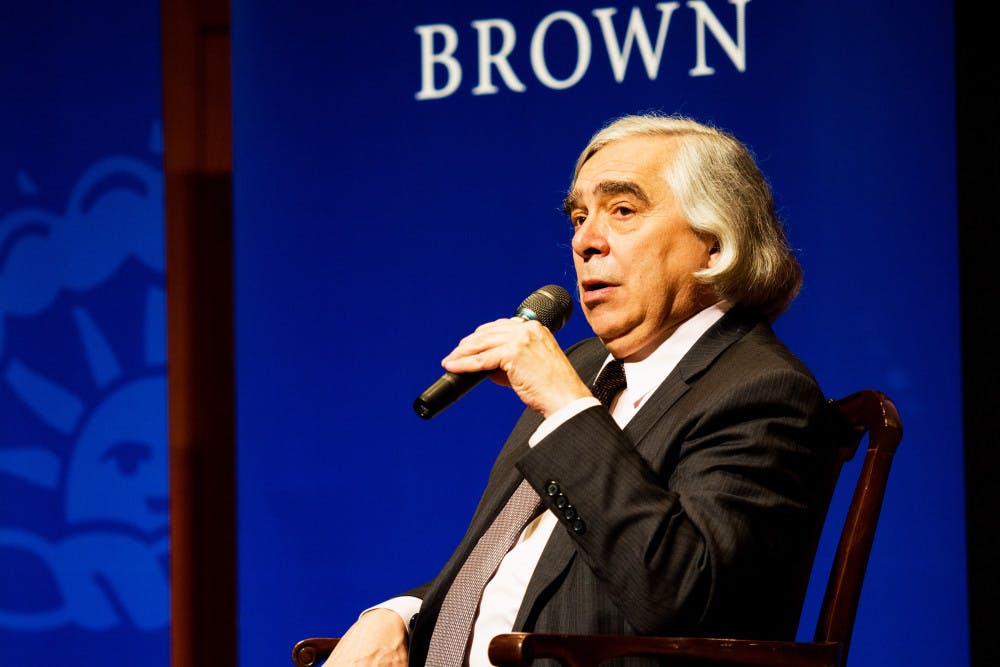U.S. Secretary of Energy Ernest Moniz delivered the 92nd Stephen Ogden Jr. ’60 Memorial Lecture on International Affairs Monday. He discussed diplomacy, the Iran Deal, nonproliferation and climate change before a packed DeCiccio Family Auditorium, which seats around 600 people.
Moniz emphasized the role that scientists played in the diplomacy that led to the Iran Deal, formally known as the Joint Comprehensive Plan of Action. “Diplomacy is not only done by diplomats,” he said. “All disciplines take part.”
Collaboration between American and Iranian scientists was essential to negotiating the JCPOA, Moniz said, adding that the talks were bolstered by the leadership of scientists with “scientists’ worldviews.”
In an interview, Moniz described the JCPOA as “the strongest nonproliferation agreement, I think, that has ever been negotiated.” Among other important limitations to its nuclear program, Iran has “committed to something that exists nowhere else: a fixed time limit for access.” Many in the nonproliferation community believe that parts of the JCPOA should be integrated into the “standard nonproliferation package” for agreements with other countries, Moniz added.
Moniz said that much of the criticism of the JCPOA focuses on the plan’s failure to address non-nuclear issues like Iran’s missile testing or support of terrorism. But he urged audience members to imagine what Iran’s nuclear program might look like without the deal. “There’s no reason to think that (without the JCPOA) 15 years from now (Iran) wouldn’t have 100,000 centrifuges and an Arak reactor producing a lot of plutonium per year,” he said in the interview.
Moniz mentioned a letter sent by 29 top U.S. scientists, including Nobel Laureate and Professor of Science Leon Cooper, to President Barack Obama. The letter applauded the JCPOA, which it described as stringent and taking unprecedented steps in certain respects.
The purpose of the JCPOA “is not to prevent a civilian nuclear program,” Moniz said in the interview. “After 15 years, Iran will have all its prerogatives to develop a peaceful (nuclear) program, but again, we have a strong verification provision that will continue beyond that,” he said.
Sam Ainsworth ’16, who attended the lecture, said, “I went in support of the Iran Deal and came out thinking: ‘Wow, that definitely worked out well for the U.S. and our national security interests.’”
Moniz also said in the interview that the 2015 Paris Climate Change Conference yielded “a remarkable outcome.” The agreement was “a very large first step — but I do emphasize, first step. So there are going to have to be large steps, many of them, after this first one, because the climate challenge, heading towards very deep decarbonization, is one that is going to be with us for this century.”
He said that the Paris Agreement, by itself, will not stop global temperatures from rising 1.5 to 2 degrees Celsius, a level that many scientists agree could lead to catastrophic climate change.
Limiting this rise is “going to rest upon more ambitious steps, which I believe will be enabled by innovation that continues dramatic cost reductions of clean energy,” Moniz added. He emphasized that the Paris Agreement calls for reviews of its commitments every five years, “with the idea that one will be more ambitious in these subsequent steps.”
Legislative action concerning climate change needs to increase at a national level, Moniz said. “I certainly believe that to get beyond this 2025, 2030 horizon, we will need Congress to work together with a future administration” to achieve a plausible legislative solution.
In the interview, Moniz also discussed the U.S. nuclear modernization program, which some have suggested is leading to a new global arms race.
“The issue of modernizing our production complex is not about new weapons, new kinds of weapons or more weapons — quite the contrary,” he said. “It’s that we have literally an infrastructure from the 1960s, which — if you sit in my chair — has plain-and-simple safety implications for our workers.”
He added that Obama is continuing to call for reducing the size of the U.S. nuclear stockpile. But “at some point, that becomes not only a bilateral, but a multilateral, conversation,” Moniz said. He noted that Russian President Vladimir Putin is not interested in engaging the United States in discussions about shrinking nuclear stockpiles.
Some audience members said that though they enjoyed the talk, they had hoped to hear about sensitive geopolitical issues that were not discussed. John Poor, a Providence community member, said that he would have liked to hear Moniz discuss India and Pakistan, especially in relation to Iran. India and Pakistan both possess nuclear weapons, and their relationship has been hostile at times. Michael Shear ’16 had hoped to hear Moniz’s thoughts on North Korea’s nuclear program.
Moniz concluded his lecture with his thoughts on diplomacy. It “is generally thought of as the negotiation of agreements between states,” and that is incredibly important, he said. “But, again, I want to reemphasize (that) the other definition of diplomacy is the promotion of good relationships, which is often the precondition when getting the first thing done.”





